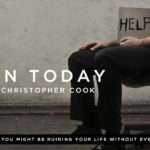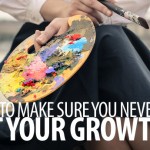Knowing your strengths and weaknesses is an essential component of living life on purpose. We all have blind spots. Yet, making a conscious effort to see and understand them is a challenge few people embrace. Left unchecked, blind spots will sabotage your potential, especially if you are a leader, because unattended blind spots have a compounding negative effect upon the people you lead.
On the subject, Dr. John Maxwell affirms, “Who we are determines how we see others. That’s why two people can see someone totally differently. We don’t see another person based on who they are. We see another person based on who we are.” What is the common denominator in that statement? Blind spots.
Simply stated, we must get past ourselves in order to properly assess situations, people, and in order to succeed long-term. My friend, the most difficult person you will ever lead in life is yourself. You are the first person you must work on! As such, I believe there are four destructive behaviors that have the capacity to cripple and dismantle your personal potential. Allow me to illustrate the devastating impact of unchecked blind spots with a personal story.
Singing the (Winter) Blues
One week ago, I was involved in a car accident near my home. It was a very wintry Saturday morning, and I was taking my time to drive with caution amidst the heavy squalls of snowfall (cue the “move to California” music). About 20 yards ahead of me (five car-lengths in driver’s ed. speak), the driver of a Chevy pickup truck was nearing the intersection where he was preparing to turn right. We had a green light, and I was headed in the same direction.
Just as the truck turned right, a red Jeep plowed through a red light at what I estimated was 15-20 miles per hour over the posted speed limit. In sheer reaction, the driver of the truck slammed on his brakes. Though I had plenty of distance in which to apply my brakes, I hit ice and headed full on into his massive bumper. There’s nothing I could’ve done to avoid the collision.
I pulled off the road where a visibly shaken and tearful elderly man named Jay greeted me. Before I could speak a word, Jay nervously apologized for abruptly slamming on his brakes to avoid being broadsided by the Jeep. His words: “I didn’t even see the Jeep. It must’ve been in my blind spot.” It may have been in his blind spot, but in my opinion, I chalk it up to an absolute idiot behind the wheel of the Jeep.
With a gentle hug, I reassured him that my car could be fixed and that I was glad he did what he did, despite the inconvenience caused, because he was alive and unscathed. Long story short, neither of us received a traffic ticket for the incident, and as of today, my vehicle is in the repair shop.
What last week’s incident proved to me is that unchecked blind spots are loaded with devastating ramifications and often affect more people than we realize. As it pertains to everyday life, I have identified four critical blind spots (behaviors) that will destroy our potential if left unchallenged.
1.) We regularly see ourselves through our intentions, not reality. When confronted about a negative situation, how many times have you responded defensively with a statement such as, “That’s not what I meant”? Certainly, misunderstandings and miscommunication happens, but as mature leaders, we must always commit to dealing with what is, not what we perceive to be true. Big people see objectively, take responsibility for their words and actions, clean up their mess, and move on with dignity and respect.
2.) We miss our non-verbal communication cues. 85% of all meaningful communication is non-verbal. That means that only 15% of what you say verbally counts for effective communication. When you speak to your children, employee, spouse, or friend, your facial expressions, posture, and gestures say a lot more than the words coming out of your mouth. When sitting with a client a while ago, I asked, “Are you upset about something?” He responded, “Definitely not. I’m having a great day,” to which I replied, “Well, I couldn’t figure that out by the scowl on your face!” Non-verbal communication matters!
3.) We confuse perception with reality. Like I mentioned a few sentences ago, we must always commit to dealing with what is, not what we perceive to be true.
4.) We regularly (and perhaps unknowingly) repeat counterproductive or even dysfunctional behavioral patterns. The way we run-over people with our words before listening thoroughly, the way we know it all, the way we send scathing email messages to co-workers, the way we jump to conclusions about people and situations, and the way we berate others and throw them under the bus because of our own insecurities is tearing down the structure of trustworthiness and respect we need so desperately for effective leadership and relationship success.
In Matthew 7:1-5 (The Message), Jesus said, “Don’t pick on people, jump on their failures, criticize their faults— unless, of course, you want the same treatment. That critical spirit has a way of boomeranging. It’s easy to see a smudge on your neighbor’s face and be oblivious to the ugly sneer on your own. Do you have the nerve to say, ‘Let me wash your face for you,’ when your own face is distorted by contempt? It’s this whole traveling road-show mentality all over again, playing a holier-than-thou part instead of just living your part. Wipe that ugly sneer off your own face, and you might be fit to offer a washcloth to your neighbor.”
Dealing with Blind Spots
Dealing with blind spots isn’t fun, but doing so is necessary if we are going to excel in life. Regarding your own blind spots, I encourage you to invite feedback into your life. Ask trusted people, “What am I missing? What do you see that I don’t see?” Asking that question comes with the assumption that you are missing something and don’t see clearly 100% of the time. And that attitude is respectable and loaded with humility. As I mentioned in a previous post, constructive criticism can either break you or build you.
Proverbs 21:2 confirms this point: “We justify our actions by appearances; GOD examines our motives.” The point is that we must face reality as it is, not as it was or as we wish it would be.
Finally, re-steer your direction and make necessary changes. It’s one thing to recognize your blind spots, but it’s another thing to face them head-on for the sake of your personal growth, character development, leadership capacity, and relationship health.
Following up with my new friend, Jay, he’s doing really well. Go figure, his massive truck barely had a scratch in the bumper. After all, last Saturday was Valentine’s Day, and in his passenger seat sat a dozen beautiful roses for his wife—roses he had the opportunity to hand-deliver. Had he been hit by the Jeep, that blind spot could’ve cost him his life.
Question: How do you humbly recognize and deal with your own blind spots?




